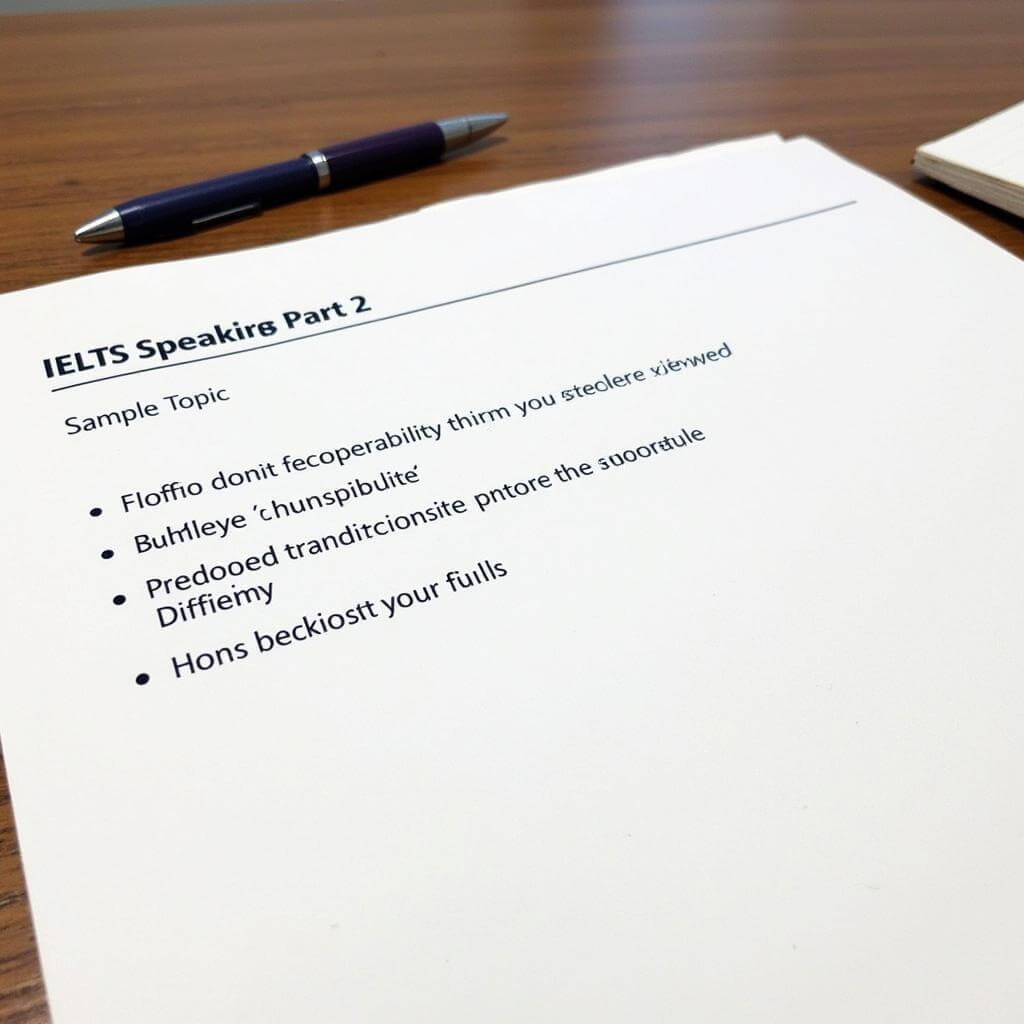Speaking Part 2 of the IELTS test can be challenging, but with proper organization, you can deliver a coherent and impressive response. This guide will help you structure your thoughts and present your ideas confidently within the given time frame.
Understanding the Task
Before diving into organization techniques, it’s crucial to grasp what IELTS Speaking Part 2 entails. In this section, you’ll be given a topic card with prompts and will have one minute to prepare before speaking for up to two minutes.
Key Components:
- Topic card with 3-4 bullet points
- 1-minute preparation time
- 2-minute speaking time

Effective Preparation Strategies
Making the most of your one-minute preparation time is crucial. Here are some strategies to organize your thoughts quickly:
- Skim the topic card rapidly
- Identify key words in each bullet point
- Jot down relevant ideas or experiences
- Create a basic outline using symbols or abbreviations
“The key to success in Part 2 is not just what you say, but how you structure it,” says Dr. Emily Chen, IELTS examiner with 15 years of experience.
Structuring Your Response
A well-organized response follows a clear structure. Here’s a recommended framework:
- Introduction: Rephrase the topic and state your main point
- Body: Address each bullet point, providing details and examples
- Conclusion: Summarize or give a final thought on the topic
This structure helps you manage fluency under pressure and ensures you cover all required points.
Developing Ideas for Each Point
For each bullet point, aim to provide:
- A clear statement or opinion
- Supporting details or examples
- Personal experiences or anecdotes
Using Connectors
Using conjunctions to link ideas is essential for a smooth, coherent response. Some useful connectors include:
- Firstly, secondly, finally
- Moreover, furthermore, in addition
- However, on the other hand
- Consequently, as a result
Time Management Tips
Managing your time effectively during the two-minute speaking period is crucial:
- Aim to spend about 30 seconds on the introduction
- Allocate roughly 30 seconds to each bullet point
- Reserve 15-20 seconds for a brief conclusion
Practice with a timer to get a feel for the pacing. It’s better to cover all points briefly than to elaborate excessively on one and neglect others.
Handling Abstract Topics
Sometimes, you may encounter abstract or unfamiliar topics. Don’t panic! Use these strategies:
- Draw from general knowledge or related experiences
- Use analogies or comparisons to explain your thoughts
- Focus on the ‘why’ and ‘how’ aspects of the topic
Developing ideas for abstract topics can be challenging, but with practice, you can improve your ability to think on your feet.
Practice Techniques
To become proficient in organizing ideas for Part 2:
- Use sample topic cards and practice regularly
- Record yourself and analyze your responses
- Time your speeches to ensure you’re hitting the 2-minute mark
- Ask a study partner or tutor for feedback
“Consistent practice is the secret to mastering IELTS Speaking Part 2,” advises Mark Thompson, IELTS preparation coach. “It’s not just about knowing what to say, but training yourself to organize thoughts quickly and effectively.”
Common Pitfalls to Avoid
Be aware of these common mistakes:
- Straying off-topic or focusing too much on one point
- Speaking too fast or too slow
- Overusing filler words (um, ah, like)
- Neglecting to address all bullet points
How to handle comparison-based questions can be particularly useful if you find yourself needing to contrast ideas within your response.
Conclusion
Organizing ideas for IELTS Speaking Part 2 is a skill that improves with practice. By following these strategies, you can approach this section with confidence, delivering well-structured and engaging responses. Remember, the key is to remain calm, use your preparation time wisely, and present your ideas in a clear, logical manner.
Frequently Asked Questions
How can I improve my vocabulary for IELTS Speaking Part 2?
To enhance your vocabulary, read widely on various topics, learn new words in context, and practice using them in your speaking exercises. Focus on descriptive adjectives and idiomatic expressions relevant to common IELTS topics.
What if I can’t think of any ideas during the preparation time?
If you’re stuck, try to relate the topic to personal experiences or general knowledge. Even if you can’t think of specific examples, you can discuss hypothetical situations or your opinions on the subject.
Is it okay to use notes during the 2-minute speech?
While you can refer to your notes, it’s best to use them sparingly. Maintain eye contact with the examiner and speak naturally rather than reading from your notes.
How can I extend my answer if I finish too quickly?
If you find yourself finishing before the 2 minutes are up, elaborate on your points by providing more details, examples, or explaining your reasoning further. You can also add a personal anecdote or opinion to extend your response.
What should I do if I don’t understand a word on the topic card?
If you encounter an unfamiliar word, try to understand the overall context of the topic. Focus on the parts you do understand and build your response around those. If necessary, you can politely ask the examiner to clarify, but this should be a last resort.